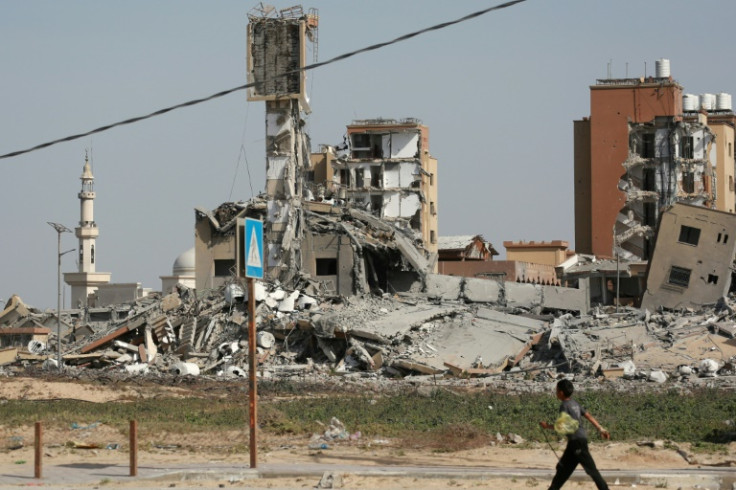
A US-based charity said Tuesday it was pausing its Gaza aid operations after seven of its staff were killed in a "targeted Israeli strike" as they unloaded desperately needed food aid delivered by sea from Cyprus.
Monday's deaths came as the Israeli army wrapped up a two-week military operation in and around the Al-Shifa Hospital which reduced the besieged territory's largest medical complex to charred ruins.
"World Central Kitchen is devastated to confirm seven members of our team have been killed in an IDF strike in Gaza," the US-based charity said in a statement.
It said those killed were "from Australia, Poland, United Kingdom, a dual citizen of the US and Canada, and Palestine" and announced that it was "pausing our operations in the region" in response.
The aid group said its team was travelling in a "de-conflicted" area in a convoy of "two armoured cars branded with the WCK logo and a soft skin vehicle" at the time of the strike.
"Despite coordinating movements with the (Israeli army), the convoy was hit as it was leaving the Deir al-Balah warehouse, where the team had unloaded more than 100 tons of humanitarian food aid brought to Gaza on the maritime route," it said.
The aid had reached Gaza earlier Monday aboard a barge and two salvage vessels which made the crossing from Cyprus in the second run for a much discussed maritime aid corridor from the European Union member state.
The Israeli military said it was "conducting a thorough review at the highest levels to understand the circumstances of this tragic incident", adding it had been "working closely with WCK" in the effort to provide aid to Palestinians.
Australian Prime Minister Anthony Albanese confirmed one of the killed aid workers was Australian national Zomi Frankcom. "This is completely unacceptable," Albanese said.
The bodies were taken to a hospital mortuary in the central town of Deir al-Balah, an AFP photographer reported.
One of them was laid on the floor on a makeshift stretcher, still wearing a top clearly emblazoned with the World Central Kitchens name and logo. Three foreign passports lay nearby.
US National Security Council spokesperson Adrienne Watson said the White House was "heartbroken and deeply troubled by the strike".
"Humanitarian aid workers must be protected as they deliver aid that is desperately needed," she wrote on X.
Israel has come under immense pressure to increase the flow of humanitarian aid into Gaza which has dwindled to a trickle after almost six months of war.
A UN-backed report warned on March 19 that half of Gazans were feeling "catastrophic" hunger and projected imminent famine in the territory's north.
Since Hamas's October 7 attacks triggered the war, Gaza has been under a near-complete blockade, with the United Nations accusing Israel of preventing deliveries of humanitarian aid.
The world's top court has ordered Israel to "ensure urgent humanitarian assistance" in Gaza without delay, saying "famine is setting in".
Foreign governments have ramped up deliveries by air and sea, although UN agencies have said repeatedly that road convoys are the only way of supplying food in the volume needed.
The airdrops have proved deadly in some cases, leading to chaotic stampedes for food.
The bloodiest-ever Gaza war erupted with Hamas's unprecedented October attack, which resulted in about 1,160 deaths in Israel, mostly civilians, according to an AFP tally of Israeli official figures.
Israel's retaliatory campaign, aimed at destroying Hamas, has killed at least 32,845 people, mostly women and children, according to the health ministry in Gaza.
There were "more terrorists in the hospital than patients or medical staff," Israeli army spokesman Daniel Hagari said.
He added that 900 suspects had been apprehended at the sprawling complex, with over 500 of them "definitely" militants.
A spokesman for Gaza's civil defence agency said Israeli forces had killed about 300 people in and around the hospital during the operation.
Medics evacuating patients from the destroyed complex had to manoeuvre stretchers between mounds of rubble.
The Israeli military said Monday that 600 soldiers had been killed since the start of the war.
During their attack on Israel, Palestinian militants also seized around 250 hostages. Israel believes about 130 remain in Gaza, including 34 presumed dead.
Israeli Prime Minister Benjamin Netanyahu is under rising pressure from the families of hostages as well as anti-government protesters, whose nightly rallies have drawn thousands onto the streets.
On Monday, Netanyahu vowed to ban broadcasts from Israel by Qatar-based news channel Al Jazeera, after the Israeli parliament granted him new powers. He called it a "terrorist channel".
The broadcaster said the Israeli prime minister's comments were a "dangerous, ludicrous lie".
The war in Gaza has raised fears of a wider regional conflagration, with repeated violence linked to the conflict in Iraq, Lebanon, Syria and Yemen.
Those fears intensified on Monday with strikes in Damascus on the consular annex of Israel's arch-foe Iran, according to Damascus and Tehran.
The Syrian Observatory for Human Rights, a war monitor based in Britain, said 11 people were killed.
Iran's Islamic Revolutionary Guard Corps, which runs military operations abroad, said seven of its members were killed, including two senior officers, Brigadiers General Mohammad Reza Zahedi and Mohammad Hadi Haji Rahimi.
Israel did not comment, but Iran's foreign minister also blamed the United States for the attack.
"The Americans must take responsibility," Foreign Minister Hossein Amir-Abdollahian said according to state news agency IRNA.
The UN Security Council was to discuss the strike later Tuesday at a meeting requested by Damascus ally Moscow.




